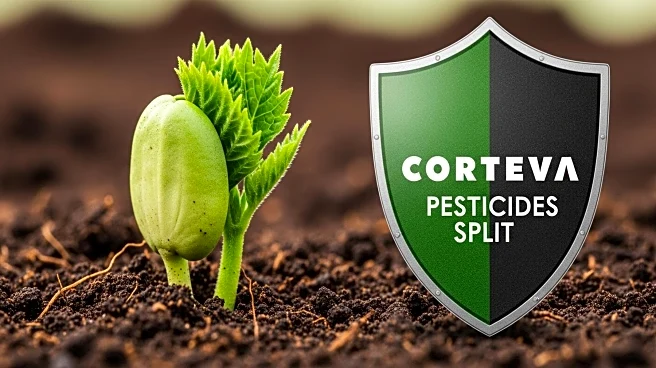What is the story about?
What's Happening?
Corteva has announced its decision to separate its seed and pesticide businesses into two distinct publicly traded companies. This strategic move aims to sharpen the company's focus and improve shareholder returns. The separation will allow each entity to develop specific capital allocation strategies, respond more swiftly to market changes, and pursue growth opportunities independently. Corteva's seed business, which generated 57% of its total net sales of $16.90 billion last year, will become a separate company. The crop protection segment, responsible for producing herbicides, fungicides, insecticides, and seed treatments, will continue under the existing company. The split follows six years of cost reductions, portfolio simplification, and investment in new technologies, strengthening Corteva's position in both segments. The company expects the spin-off to be completed in the second half of 2026.
Why It's Important?
The separation of Corteva's seed and pesticide units is significant for the agricultural industry as it allows each business to focus on its core competencies and adapt to market dynamics more effectively. This move is expected to unlock greater value for shareholders by enabling tailored growth strategies and improved resource allocation. The decision reflects a broader trend among industry giants, such as Kraft Heinz and Warner Bros Discovery, who have pursued similar spin-offs to enhance strategic focus. By creating two specialized entities, Corteva aims to capitalize on divergent opportunities in the crop protection and seed markets, potentially influencing other major players to reconsider their corporate structures.
What's Next?
Following the split, Corteva's current CEO Chuck Magro will lead the new seed-focused company, while Greg Page will remain as chairman of the crop protection segment. The transaction requires several approvals, including final board authorization and SEC registration statement effectiveness. The separation is projected to be completed in the second half of 2026, with both companies targeting investment-grade credit ratings and maintaining flexibility for organic growth and strategic acquisitions. As the planning process unfolds, additional details about operational structures, headquarters locations, and market strategies will be announced.
Beyond the Headlines
The separation of Corteva's businesses could have broader implications for the agricultural industry, potentially prompting other companies to reevaluate their strategic priorities and corporate structures. By focusing on specific market segments, Corteva aims to enhance its ability to innovate and address evolving farmer needs, particularly in areas like biologicals and genetic research. This strategic shift may lead to increased competition and innovation within the industry, driving advancements in sustainable agriculture and crop protection technologies.
















